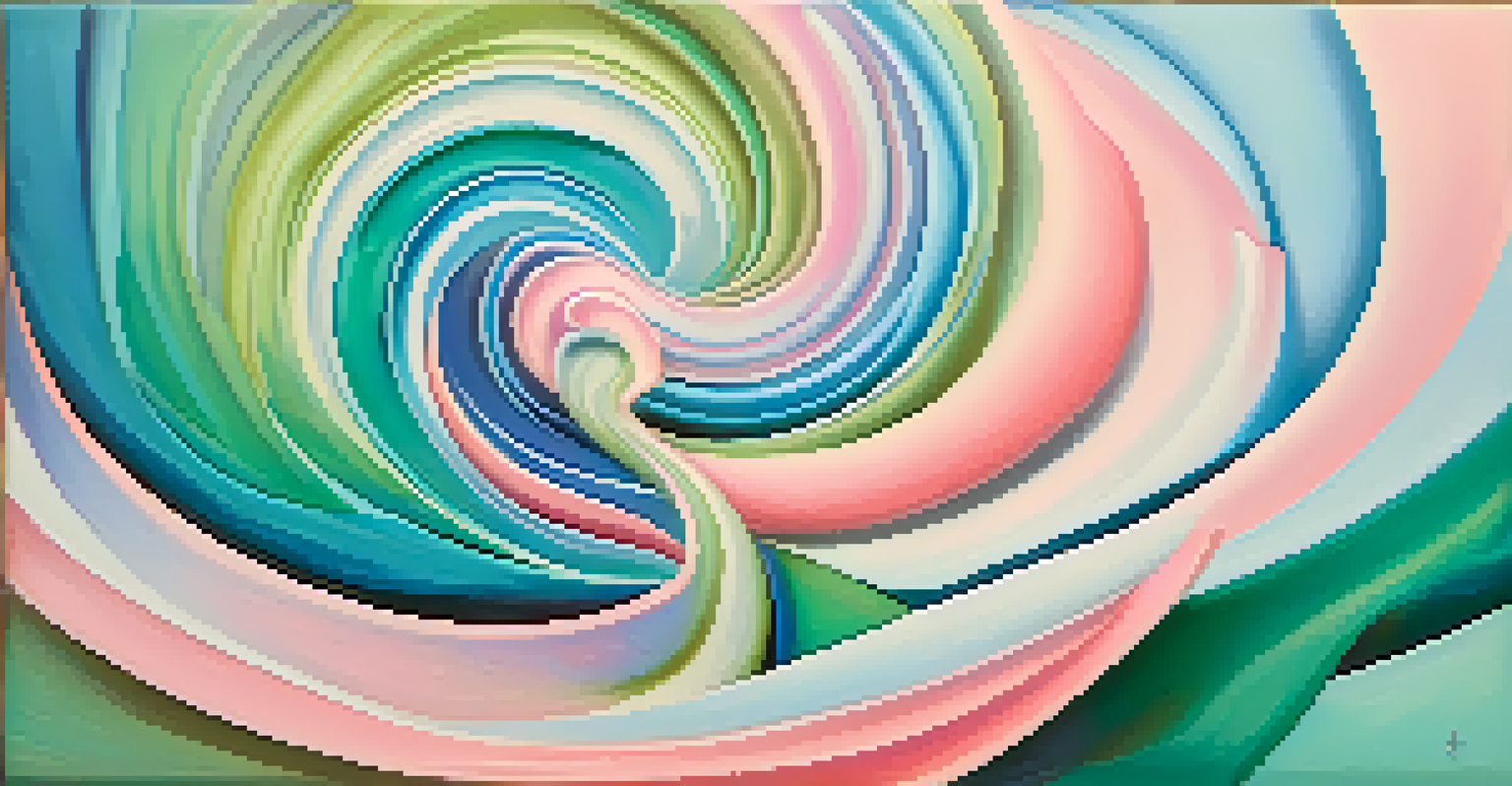Non-Dual Awareness: Perspectives from Hallucinogenic Use

Understanding Non-Dual Awareness and Its Importance
Non-dual awareness refers to a state of consciousness where the distinction between the self and the universe dissolves. In this state, individuals often experience a profound sense of unity and interconnectedness. This perspective can shift how we perceive reality, moving beyond the typical dualities of good and bad, self and other.
The greatest discovery of my generation is that a human being can alter his life by altering his attitude.
The significance of non-dual awareness lies in its potential to foster greater compassion and understanding. When we see ourselves as part of a larger whole, it becomes easier to empathize with others. This shift can lead to transformative changes in how we interact with the world.
Exploring this concept further can illuminate the depths of human consciousness and our relationship with existence. It invites questions about the nature of reality and the self, encouraging a deeper inquiry into our lived experiences.
The Role of Hallucinogens in Expanding Consciousness
Hallucinogens, such as psilocybin mushrooms and LSD, have been used for centuries in various cultures to explore consciousness. These substances can alter perception, leading users to experience realities beyond the mundane. Many users report feelings of unity and oneness during their experiences, echoing the tenets of non-dual awareness.

The effects of hallucinogens can often facilitate a departure from the ego, allowing individuals to perceive themselves as part of a larger whole. This can create a profound sense of peace and understanding, which aligns closely with non-dual awareness. Research supports these claims, showing that psychedelics can lead to lasting changes in attitudes and behaviors.
Non-Dual Awareness Unifies Perception
Non-dual awareness dissolves the perceived boundaries between self and universe, fostering a profound sense of interconnectedness.
As interest in the therapeutic potential of these substances grows, understanding their connection to non-dual awareness becomes increasingly relevant. This intersection offers insights not only into mental health treatments but also into the fundamental nature of consciousness.
Personal Experiences: Stories of Non-Dual Awareness
Many individuals who have experimented with hallucinogens share transformative experiences that highlight non-dual awareness. For instance, one individual described a moment during a psychedelic journey where they felt completely at one with their surroundings. This experience left them with a lasting sense of connection to nature and humanity.
We are not human beings having a spiritual experience; we are spiritual beings having a human experience.
These personal stories often reveal common themes, such as the dissolution of the ego and the emergence of a feeling of oneness. Participants frequently express that these experiences provided clarity and a renewed perspective on life. They often return from these journeys with insights that seem to transcend ordinary understanding.
Such narratives not only enrich our understanding of non-dual awareness but also reflect the diverse ways individuals may experience and interpret their journeys. They remind us that the exploration of consciousness can be deeply personal and profoundly impactful.
Scientific Perspectives on Hallucinogens and Awareness
Recent studies have begun to uncover the neurobiological underpinnings of the experiences induced by hallucinogens. Researchers have found that these substances can temporarily alter neural pathways, leading to experiences of non-dual awareness. This scientific lens provides a framework for understanding the psychological and physiological changes that occur.
Brain imaging studies show that hallucinogens can reduce activity in the default mode network (DMN), a brain region linked to self-referential thoughts and the ego. This reduction can lead to experiences of ego dissolution, allowing for the emergence of a non-dual state. Understanding these mechanisms helps bridge the gap between subjective experience and scientific inquiry.
Hallucinogens Enhance Consciousness
Substances like psilocybin and LSD can facilitate experiences of non-dual awareness, promoting feelings of unity and ego dissolution.
As our knowledge in this area expands, it opens up exciting possibilities for integrating hallucinogens into therapeutic practices. The potential to harness these substances for personal growth and healing is a topic of increasing interest among both scientists and practitioners.
Cultural Context: Hallucinogens and Spiritual Traditions
Throughout history, many cultures have utilized hallucinogens as tools for spiritual exploration. Indigenous peoples, for example, have long used substances like peyote and ayahuasca in ceremonial settings to achieve altered states of consciousness. These practices often aim to foster a sense of non-dual awareness and connection to the spirit world.
In these cultural contexts, the use of hallucinogens is often accompanied by rituals and guidance from experienced shamans. This framework can enhance the safety and significance of the experience, helping participants navigate their journeys. It highlights the importance of intention and context in achieving meaningful insights.
Understanding these cultural practices enriches our appreciation of how non-dual awareness can be accessed. It also invites us to consider how modern approaches to psychedelics might integrate these traditional wisdoms for a more holistic understanding.
Challenges and Misconceptions Around Hallucinogenic Use
Despite the growing interest in hallucinogens, there are still significant misconceptions around their use. Many people associate these substances solely with recreational use or negative experiences, overshadowing their potential for personal growth. This stigma can deter individuals from exploring their benefits in a mindful context.
Additionally, the unregulated use of hallucinogens can lead to unsafe situations and adverse effects. It’s crucial for individuals to approach these substances with caution, ideally under the guidance of trained professionals. Education about responsible use is essential to mitigate risks and ensure positive outcomes.
Cultural Wisdom Guides Usage
Indigenous practices highlight the importance of context and intention in using hallucinogens for spiritual exploration and attaining non-dual awareness.
Addressing these challenges requires a cultural shift in how we perceive and discuss hallucinogens. By promoting informed conversations and responsible practices, we can create a more supportive environment for exploration and healing.
Future Directions: Research and Integration of Insights
As interest in the therapeutic uses of hallucinogens continues to grow, so does the need for rigorous research. Future studies can help clarify the mechanisms behind the experiences of non-dual awareness and how they might be harnessed for healing. This research could lead to breakthroughs in mental health treatments and spiritual practices.
Integrating insights from various fields—psychology, neuroscience, and spirituality—can foster a more comprehensive understanding of consciousness. This multidisciplinary approach could help demystify the experiences associated with non-dual awareness and hallucinogens, making them more accessible to a wider audience.

Ultimately, the future of this exploration holds promise not only for individual healing but also for collective understanding. As we continue to delve into these profound topics, we can cultivate a deeper appreciation for the interconnectedness of all beings.